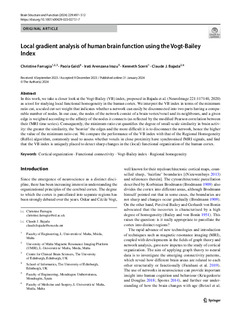| dc.rights.license | Attribution 4.0 International | |
| dc.contributor.author | Arenzana Irazu, Irati | |
| dc.contributor.other | Farrugia, Christine | |
| dc.contributor.other | Galdi, Paola | |
| dc.contributor.other | Scerri, Kenneth | |
| dc.contributor.other | Bajada, Claude J. | |
| dc.date.accessioned | 2024-02-02T08:53:02Z | |
| dc.date.available | 2024-02-02T08:53:02Z | |
| dc.date.issued | 2024 | |
| dc.identifier.issn | 1863-2661 | |
| dc.identifier.other | https://katalogoa.mondragon.edu/janium-bin/janium_login_opac.pl?find&ficha_no=174465 | |
| dc.identifier.uri | https://hdl.handle.net/20.500.11984/6195 | |
| dc.description.abstract | In this work, we take a closer look at the Vogt-Bailey (VB) index, proposed in Bajada et al. (NeuroImage 221:117140, 2020) as a tool for studying local functional homogeneity in the human cortex. We interpret the VB index in terms of the minimum ratio cut, a scaled cut-set weight that indicates whether a network can easily be disconnected into two parts having a comparable number of nodes. In our case, the nodes of the network consist of a brain vertex/voxel and its neighbours, and a given edge is weighted according to the affinity of the nodes it connects (as reflected by the modified Pearson correlation between their fMRI time series). Consequently, the minimum ratio cut quantifies the degree of small-scale similarity in brain activity: the greater the similarity, the ‘heavier’ the edges and the more difficult it is to disconnect the network, hence the higher the value of the minimum ratio cut. We compare the performance of the VB index with that of the Regional Homogeneity (ReHo) algorithm, commonly used to assess whether voxels in close proximity have synchronised fMRI signals, and find that the VB index is uniquely placed to detect sharp changes in the (local) functional organization of the human cortex. | |
| dc.language.iso | eng | |
| dc.publisher | Springer | |
| dc.rights | © 2024 The Authors | |
| dc.rights.uri | http://creativecommons.org/licenses/by/4.0/ | |
| dc.subject | Cortical organization | |
| dc.subject | Functional connectivity | |
| dc.subject | Vogt-Bailey index | |
| dc.subject | Regional homogeneity | |
| dc.title | Local gradient analysis of human brain function using the Vogt-Bailey Index | |
| dc.type | http://purl.org/coar/resource_type/c_6501 | |
| dcterms.accessRights | http://purl.org/coar/access_right/c_abf2 | |
| dcterms.source | Brain Structure and Function | |
| local.description.peerreviewed | true | |
| local.identifier.doi | https://doi.org/10.1007/s00429-023-02751-7 | |
| local.contributor.otherinstitution | https://ror.org/03a62bv60 | |
| local.contributor.otherinstitution | https://ror.org/01nrxwf90 | |
| local.source.details | 2024 | |
| oaire.format.mimetype | application/pdf | |
| oaire.file | $DSPACE\assetstore | |
| oaire.resourceType | http://purl.org/coar/resource_type/c_6501 | |
| oaire.version | http://purl.org/coar/version/c_970fb48d4fbd8a85 | |








